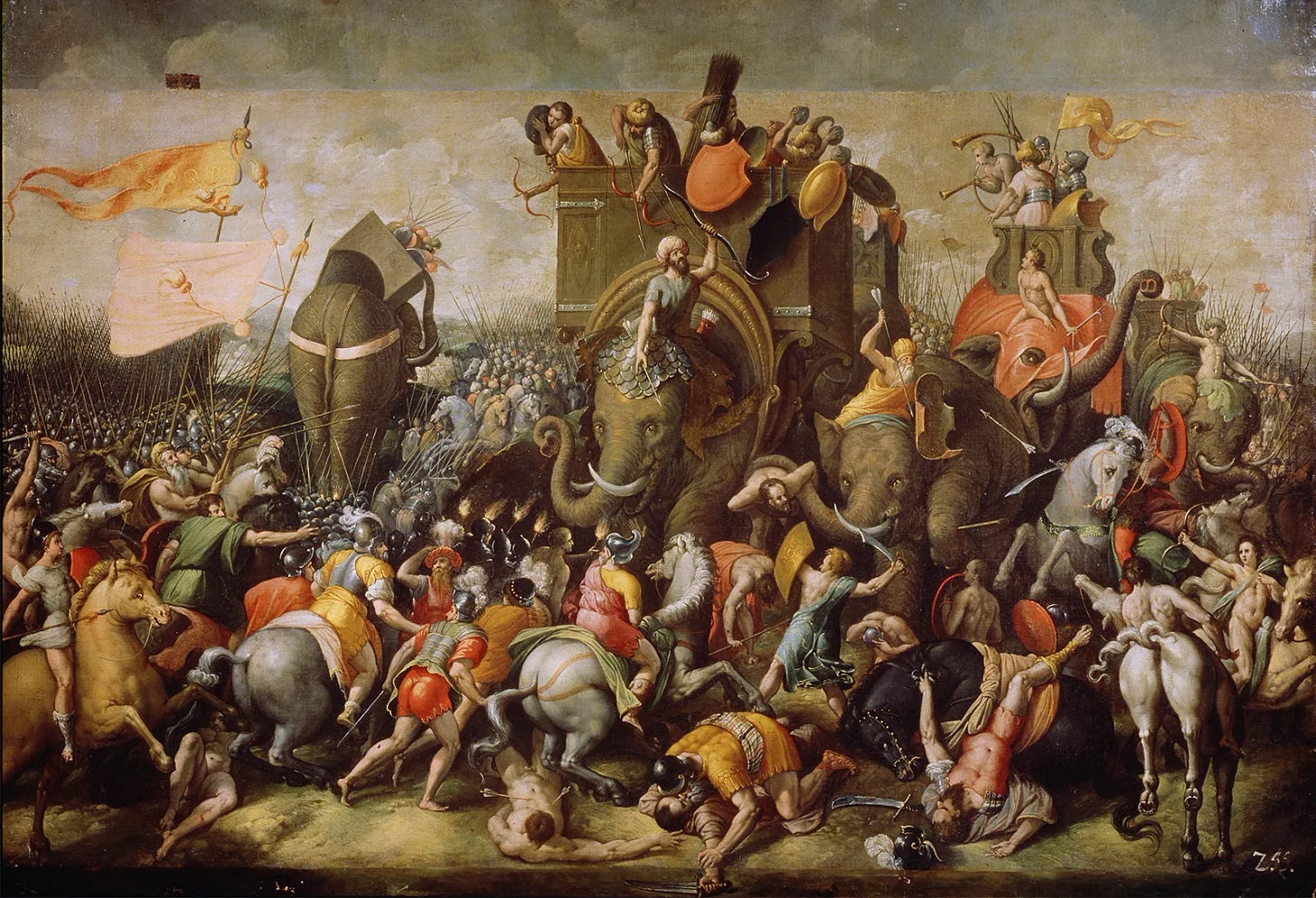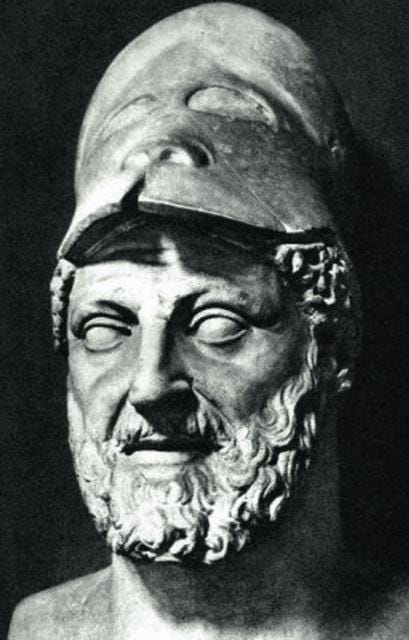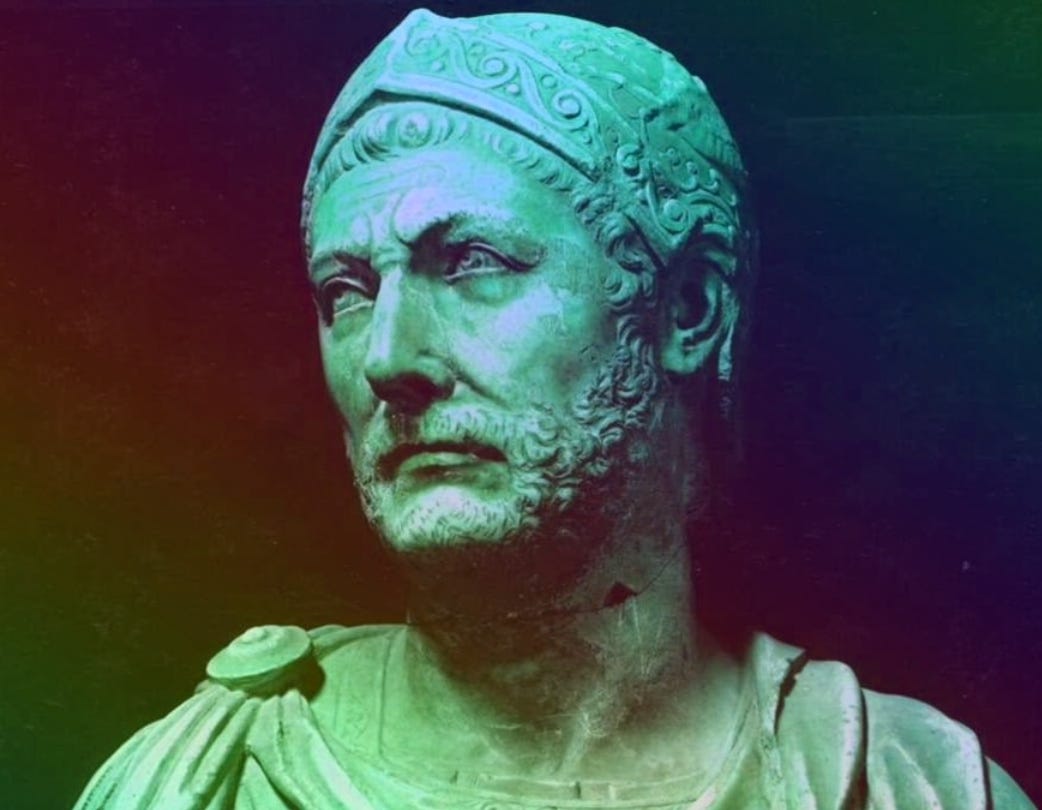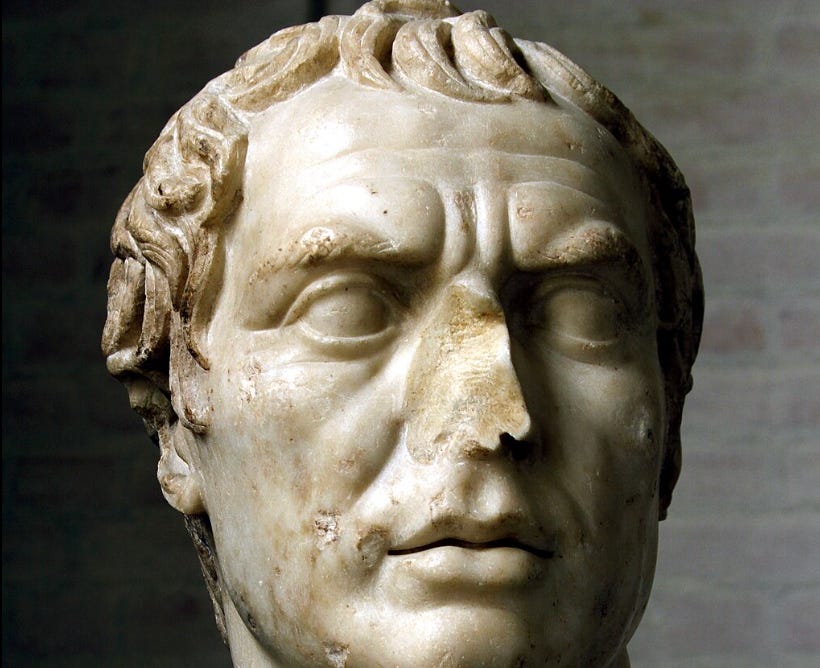Why Was Hannibal Defeated? And What If He Had Won?
The Silence of the Elephants
Dear Classical Wisdom Reader,
Few things appear to be as motivating as sheer, unadulterated hatred. I’m not saying this is a good thing... but it quite literally lights a fire from below and makes the men and women of history move.
One excellent example of both the inspiration and destruction caused by such a strong sentiment is the history of Carthage.
Founded in the 6th century, Carthage was Rome’s complete antithesis. While the Romans expanded by conquest, Carthage built its empire on trade... and when the Romans arrived, they had a tendency of outright annihilation of conquered lands, whereas the Carthaginians offered annual tribute for established colonies. The Romans sought a singular Roman identity. The Carthaginians allowed for differing national identities.
And yet, when it came to Rome, Carthage had a huge blindsight, stoked by an all consuming hatred.
The two great rivals came to a head in 264 BC with the beginning of the Punic Wars. Lasting almost a century and including three decisive wars, the end result is well known. The entire ruin and destruction of Carthage in 146 BC and the emergence of Rome as a superpower.
But... what would have happened if Carthage had won instead? After all, the famous general Hannibal Barca almost seized Rome after famously crossing the Alps 2,242 years ago today...
Indeed, so pivotal was that glamorous arrival with his army of elephants, it is worth a deep dive. So please enjoy today’s article which looks into the humbling of Hannibal below to see exactly why was Hannibal defeated...
Enjoy! And leave your alternative historical suggestions in the comments section below..
All the best,
Anya Leonard
Founder and Director
Classical Wisdom
This week Members will enjoy a Classical Wisdom Standoff: Heraclitus Vs. Parmenides. How does the philosopher of fire and flux compare to the man who posited motion was impossible? What insights did these pre-Socratic thinkers had with regards to the universe and metaphysics? Stay tuned to find out!
If you aren’t a member, subscribe today to read our upcoming Classical Wisdom Standoff, as well as last week’s podcast with Professors, featuring Dr. Daisy Dunn.
The Humbling of Hannibal
By Ben Potter
It is one of the most enduring and dramatic images from antiquity, one that widens the eyes, dilates the pupils, quickens the pulse and ignites the imagination – especially when we hear about it in childhood.
Once heard, the moment is forever emblazoned on the mind’s eye: the African general, Hannibal, perilously crosses the craggy and frozen Alps, leads a daring raid on the Northern Italian plains, and takes the fight to the most organized and efficient war machine the world has ever seen… and all of this done astride the back of an elephant!
Glossing over, for one second, that large dollop of artistic license that would have made even Livy blush, what else can we say about the self-proclaimed third greatest general who ever lived (behind Alexander the Great and Pyrrhos of Epeiros, if you’re interested)?
Well if, unlike mine, your mind wasn’t stuck on repeat going ‘elephants…elephants…elephants’ when you first heard the story, you might remember Hannibal’s and Carthage’s demise at the battle of Zama in 202BC; a battle that gave rise to one of Republican Rome’s greatest ever heroes, Scipio Africanus.
N.B. Scipio’s is obviously still held in pretty high regard, as he is evoked in the third line of the Italian national anthem.
So, what happened to change the fortunes of the man who humiliated the Romans at the Battle of Cannae in 216 BC (at which as many as 70,000 Roman soldiers are reported to have died), then pushed his army on to the gates of The Eternal City itself in 211 BC?
In short, the question we’re asking is… (elephants…elephants…stop it!)… Why was Hannibal defeated?
Many believe the root of the entire Hannibal versus Rome conflict was a family affair; the unfinished business of his father, Hamilcar Barca.
Hamilcar was an outstanding general who led guerrilla raids against the Romans between 247 and 242BC – tactics that he thought would bring about the eventual demise of the empire. Thus, in an ancient parallel of the epiphany Hitler received in his hospital bed at the end of WWI, when Carthage surrendered to Rome in 241 BC, the betrayal led to a wrath which led to an obsession – Hamilcar wanted to see Rome on her knees.
This bloodlust intensified when Rome took advantage of Carthage’s dispute with her unpaid mercenaries, broke the terms of the peace treaty, and annexed Sardinia and Corsica.
N.B. The particular irony here is that the Roman stereotype of a Carthaginian was one who was both devious and cunning.
Despite the red mist, Hamilcar was still an astute tactician, he knew an all out attack on Rome, with her citizen militia, would be doomed to failure; a more circuitous and patient approach was needed.
Luckily, as the Carthaginian relationship between the government and the military was much looser than in Rome, Hamilcar didn’t need to wait for permission to go about his business; he fled to Spain and began carving out his own fiefdom.
Whilst, officially, this was part of the Carthaginian Empire, Hamilcar was very much autonomous and acted accordingly; he married his sons to Iberian women, made the indigenous people swear loyalty to him personally (rather than to Carthage), and even issued his own currency.
This strong command, personal loyalty and not inconsiderable wealth was the bedrock upon which Hannibal could begin to amass a force to even consider an assault on Rome.
Hand in hand with this is the myth of the sacred oath that Hamilcar Barca made Hannibal swear en route to Spain in 237 BC: ‘never to show goodwill to the Romans’. This is often interpreted as a lifelong, inherited and unbreakable vendetta.
So, Hannibal spent his upbringing by his father’s side learning the arts of politics and warfare, and, just as importantly, learning how to hate the Romans. Indeed, perhaps our best source on the Hannibalic Wars, Polybius, believed that Hamilcar’s wrath was the driving force for Hannibal’s Roman expedition.
Just as Philip II of Macedon laid the foundations for his, more famous, son, Alexander the Great, so Hamilcar Barca’s drive, ability and success were what allowed Hannibal to be in the position to make such a name for himself in a manner that eclipsed his father’s considerable achievements.
However, Hannibal’s single-mindedness may have been what brought about his downfall.
Had Hannibal returned to Spain after his historic victory at Cannae, then he may have been able to wage war against the Romans on ‘home’ turf (and perhaps even destroy Scipio to-be-Africanus).
Indeed, though it was his most famous moment, that moment of irrepressible glamour, the very fact that he crossed the Alps in the late autumn of 218 BC is considered, by some, to be a tactical blunder in itself as many of his precious war elephants and troops died in the process.
That Hannibal had learnt to loathe the Romans was, in a way, a millstone around his neck. Had he merely wanted to obliterate Rome, then his task may have been simpler, but he wanted to humiliate her, to see her reduced to a humble and insignificant city-state and force a war-indemnity upon her.
Such a grand mandate required a grand ego, an ego that Hannibal, the self-proclaimed third greatest general, may not quite have possessed. Without the unequaled arrogance of an Alexander figure, Hannibal never quite convinced anyone that he was the man to rent Rome asunder. Indeed, even though he parked his troops outside the gates of Rome in order to draw Roman troops away from the besieged rebel town of Capua, the act was barely met with a raise-eyebrow of Roman acknowledgment.
The siege of Capua proved too much for the city to withstand. The Romans, swift and merciless to the traitors, completely obliterated it. To rub salt into the wound, and demonstrate a fantastic ‘keep calm and carry on’ attitude, the land on which Hannibal was camping was sold at auction for its full price.
This was a bitter blow as Capua was supposed to be one of the success stories of the invasion, although, generally, Hannibal had little success in recruiting Italian towns to his cause. Although many were dissatisfied with rule from Rome, there was a strong case of ‘better the devil you know’ for many settlements. Not only was Hannibal a foreign barbarian, but he used Gaulish mercenaries. It is difficult to fully communicate the disdain the Italian towns felt for their neighbors from Gaul – they were the Roman bogeyman, even the bravest amongst whom were considered as nothing more than a ‘noble savage’.
When it came to confident leadership, Hannibal had nothing on the Roman Senate. They never allowed themselves to contemplate that Carthage was anything other than an inconvenience to be dealt with in due course.
In stark contrast to the Carthaginians who crucified their unsuccessful generals, if a Roman consul suffered a military defeat… what of it? He’d be replaced in a couple of years and the next would-be hero would have his chance at immortality. Money? No problem. That was pouring in from the east. Men? There was always more arrow fodder that could be drafted into the ranks (Rome itself had two legions stationed within her walls).
If it were only this, Roman arrogance, a frenzied father’s bitter bile, and obstinate Italian towns which Hannibal had to contend with, to rail against, or to shatter at source, then he may have had a chance. Unfortunately for him, this was only the tip of the iceberg.
Different political systems and degrees of political competency in Rome and Carthage were hugely important to the eventual defeat of Hannibal in the Second Punic War (218-201 BC).
Not once during the conflict did the Romans entertain the idea that defeat was an impending possibility, not even after suffering the worst military reverse in their history at the Battle of Cannae (216 BC).
This stiff-upper-lip attitude was even more impressive when we consider that Cannae was preceded by the disaster at Lake Trasimene (217 BC), where fog conspired with a Carthaginian trap to allow them to successfully destroy some 30,000 Roman soldiers, and the Battle of the Trebia (218 BC), where Hannibal tricked the slow-witted Romans, under the command of Tiberius Sempronius Longus, into wading into the freezing December waters before ambushing them to the tune of another 30,000 casualties.
But these were all blunders of tactics and warfare on the ground. Such poor leadership was sharply contrasted with sound, sensible and resolute decision-making in the Senate. Indeed, the very moment Hannibal set foot in Northern Italy the Senate dispatched a force (led by Publius Cornelius Scipio – father of Africanus) to the Spanish mainland to attempt to cut supply lines there, a policy they mirrored in the Aegean where Philip V of Macedon threatened to offer aid to Carthage.
Also, at home, the Senate showed a merciless, efficient approach. They urged Latin towns to scorch their earth rather than allow Hannibal’s troops to live on it and dealt severely with any town in Italy which showed sympathy towards the Carthaginian cause; the pitiless annihilation of Capua being the best example.
In contrast, Carthage kept politics and the military rather more separate. There did not seem to have been any clear, centralized military plan – certainly not one where the head of the army and the center of government were singing in harmony from the same hymn sheet. Additionally, Carthage sent only 5% of its possible reinforcements to Hannibal throughout the war. What is more, unlike the Romans, Carthage treated her African colonies with contempt, cruelty and disdain; they didn’t even bother to leave them with adequate fortifications. Thus, when Rome finally swept into the continent, they were greeted with little military or civic resistance.
But it was affairs in Hispania, not Italy or Carthage, which determined the course of the war. Spain proved an excellent stomping ground for the Romans, not only in regard to restricting supplies to Hannibal, but also as an arena in which the talents of the young Scipio Africanus could blossom.
The decision of the Senate to appoint Scipio to Spain with proconsular powers in 211 BC was for a very simple reason… he was the only viable candidate. Following a number of high-profile Roman deaths at the hands of Carthage, Scipio, despite his tender years, was the natural choice for the position.
Doubts amongst some factions of the Senate to entrust someone so young with such an important task may have been quelled by Scipio’s legendary arrogance (he compared himself to Jupiter) and infectious personality. Indeed, according to renowned historian G.P. Baker, the Senate ‘liked his youth, his courage, his family… and admired his impudence;’ but even still, ‘never before in all the history of Rome had an authority so great been vested in a man so young and inexperienced’.
The Senate’s faith paid off – Scipio set about conquering Spain in an almost Hannibalic manner. After brilliantly taking New Carthage and securing their prized silver mines, Scipio, on the order of the Senate, went to prevent Hasdrubal Barca from crossing into Italy and meeting up with his brother. However, Hasdrubal showed himself worthy of the family name – he sent a decoy force to engage Scipio and slipped over the Alps with little fuss (having learnt from the mistakes of his brother no doubt).
Despite some resistance in the Senate, Scipio was allowed to go to Africa to end the war once and for all. Just before the decisive battle of Zama, he and Hannibal met face to face and were said to have been impressed with each other; a factor that may explain why Scipio was reluctant for Rome to pursue the defeated general after Carthage fell.
Indeed, at Zama (202 BC), Scipio paid Hannibal the ultimate, if rather backhanded, compliment of using Hannibal’s own tactics from the battle of Cannae against him.
Although Zama is universally viewed as the effective end of Carthaginian resistance, by that time the war was already lost and victory for Rome merely a matter of time.
Interestingly, the single most important battle that led to the defeat of Hannibal was one at which he was not even present. The battle of Metaurus (207 BC) not only prevented Hannibal from gaining reinforcements, one of which was his brilliant brother Hasdrubal, it was also the battle that changed public opinion in Rome. Before, defeat had been unimaginable, but victory also looked a long way off. For the first time since the conflict began, the Romans believed that victory was not only obtainable, but likely; they believed that they could not expel Hannibal from Italy, but also push on and conquer Carthage itself.
Though the Second Punic War is often boiled down to Hannibal versus Scipio, there were two unsung, and still relatively unknown, generals who turned the table for Rome at Metaurus.
The peculiar and cantankerous Livius and the fearless and obdurate Nero were the men who confronted Hasdrubal on the plateau of St. Angelo (in central Italy), forcing him into a long and stamina-sapping battle, made all the more difficult for Hasdrubal by the roaringly drunk status of his Gaulish mercenaries.
Hasdrubal, a gallant soldier to the last, saw his troops were faltering and made one last, forlorn effort by charging directly into the Roman ranks where he was promptly slain.
In one grueling moment Hannibal had lost his brother, his greatest general, 60,000 troops and the initiative in the war. Cannae had been avenged. The Senate, recognising the importance of the moment, voted three days of thanksgiving for the magnificent triumph.
Hannibal came face to face with the reality of his situation when Nero tossed Hasdrubal’s head into the Carthaginian ranks at Canusium; a triumphant and mocking gesture from an army who had been on the back foot for so long.
Hannibal, like so many others, had failed to bring Rome to her knees. Though it’s interesting to note the myriad of factors that may have counted against him—the blind anti-Roman wrath he inherited from his father, the poor planning of, and lack of reinforcements from, the Carthaginian government, the resolution of Rome and the skill of Africanus—the truth is that he never really stood a chance. Rome’s supplies of troops were inexhaustible when compared to Hannibal’s. Even at Canane there were 5,700 Carthaginian casualties, and considering that he only entered Italy with 26,000, even his great victories were bringing about his eventual demise.
As a personal footnote to the end of the war, Hannibal actually continued to be a thorn in Rome’s side for nearly twenty years after Zama. As a man on the run, he became Rome’s public enemy no.1 – some historians have compared Rome’s obsession with catching and killing him to America’s pursuit of Osama Bin Laden post 9/11 – and found himself being entertained at the courts of some of the most exalted leaders in the Mediterranean world. Indeed, Rome’s foreign policy in the post-war period was heavily dictated by other states’ willingness to help them in their pursuit of Hannibal.
Eventually, as the Roman juggernaut continued its inexorable expansion, Hannibal’s friends became fewer and fewer. One of military history’s most colorful characters finally met his end when he poisoned himself in 183 BC rather than fall into Roman hands. He (supposedly) left behind these wonderful words, which may well have just, one final time, ruffled a few Roman feathers and, of course, made his father proud:
“Let us relieve the Romans from the anxiety they have so long experienced, since they think it tries their patience too much to wait for an old man’s death”.







Trumpets extol Scipio, yet not a whistle for Fabius.
I liked this piece and and it paints a nice picture of some of the main events and characters of the Punic Wars. The issue of supply lines I think is the key to understanding Hannibal’s defeat, and raised well here with regard to Hispania. Perhaps some analysis of the naval situation during the period discussed would add to the picture?